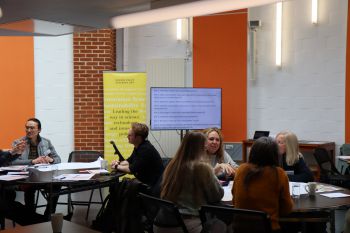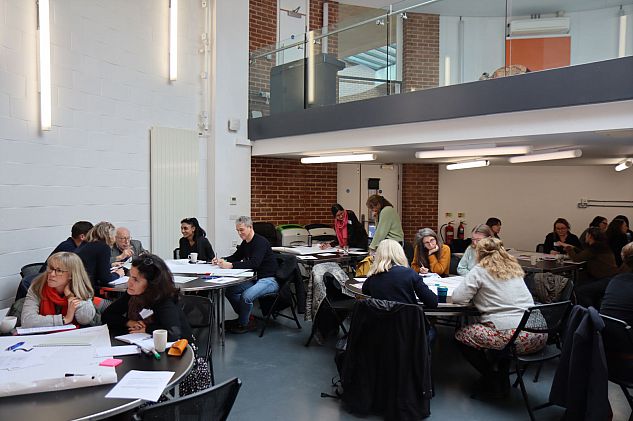News
Working together to inform a fair food system for Brighton
Posted on behalf of: Ruby Scott, Research Communications
Last updated: Monday, 3 June 2024

The Brighton and Hove Food Strategy Event
In 2020, Brighton and Hove was the first in the country to receive the prestigious ‘Sustainable Food Places’ gold award, recognising pioneering work across a range of key food issues. Dr Adrian Ely, Reader in Technology and Sustainability in the Science Policy Research Unit (SPRU) reflects on recent efforts from the Business School and partner organisations as the city continues to build on this success.
Refreshing the city’s food strategy
Our food relates to health, agriculture, education and social policy, and a city-wide food strategy like Brighton and Hove’s can help make a real difference to people’s quality of life, environment and local economy. Food research and policy is fundamental to an effective food strategy and a range of disciplines can contribute expertise like the natural and social sciences, law, medicine and the humanities.
With the end of the latest strategy phase (2018-2023), the city’s food strategy is being refreshed again through a renewed process led by the Brighton and Hove Food Partnership. An expert panel advising the process asked Adrian Ely to bring relevant research taking place across the University of Sussex, the Institute of Development Studies and other universities, into this food strategy refresh.
This was a challenge. Business School colleagues have engaged with city-level food debates at various points over the past decade, from evaluating community growing in 2013 to monitoring the impact of the strategy in 2017. However this time around, the volume and diversity of relevant research seemed greater, and the dramatic changes since the Covid pandemic meant that emerging evidence from within and beyond academia needed to be taken into account.
Fortunately, the challenge also provided an opportunity to build on wider, cross-campus networks, nurtured by initiatives like the STEPS Centre, the Sussex Sustainability Research Programme, and the Brighton and Sussex Universities Food Network, with its membership stretching far beyond the University. These experiences of “transdisciplinary” work have equipped us with the skills to reach across disciplinary and departmental lines, and to work together towards shared challenges.

Bringing research together across disciplines
The Business School hosted a ‘Research and Evidence Review’ on Thursday 7 March 2024, involving over 20 researchers from across the Universities of Sussex, Brighton, Birkbeck, Kingston, and IDS.
From Sussex, we were joined by colleagues from the Brighton & Sussex Medical School, Life Sciences, the Business School, IDS and Law. A range of topics were discussed, for example, Dr Tilly Paz (Medical School) on poverty proofing the school day, Dr Katerina Psarikidou (SPRU) on the FoodSEqual project, and Dr Beth Nicholls (Life Sciences) on urban food production.
Researchers were able to share relevant research with the stakeholders involved in the day to day running of the strategy, reflecting on potential improvements that could be made. Stakeholders included Brighton and Hove City Council (councillor and officers), the Food Partnership, Food Matters and other action-oriented groups like FareShare Sussex and Surrey.
These insightful discussions produced a report, which could help to inform future policy and action.
Moving food forwards
Reflecting on the event, Senior Manager of Brighton and Hove Food Partnership, Ali Ghanimi, stated:
“I think it’s really important that our city’s food strategy and action plan is evidence-based and informed by the latest research and data. So I’m delighted with the work we did today, focusing on the priorities, and what will make a difference, whilst ensuring this feeds into the city’s food strategy for the next five years.”
Beyond delivering evidence to inform the food strategy, the event also provided opportunities to extend existing networks around food, and to build and maintain relationships across and beyond disciplines, all of which have been shown to be particularly important in transdisciplinary initiatives. As the process to develop and implement the strategy continues, these networks will prove ever more valuable.
The Brighton and Hove Food Strategy was initiated in 2006 by Food Matters and the strategy refresh process is led by the Brighton and Hove Food Partnership.